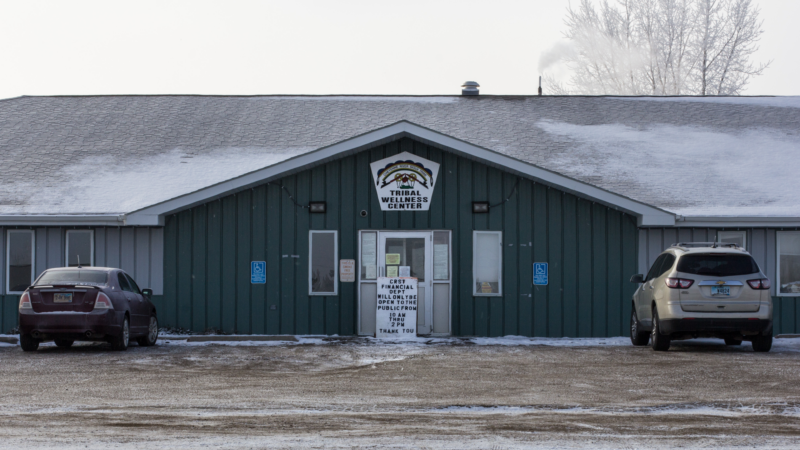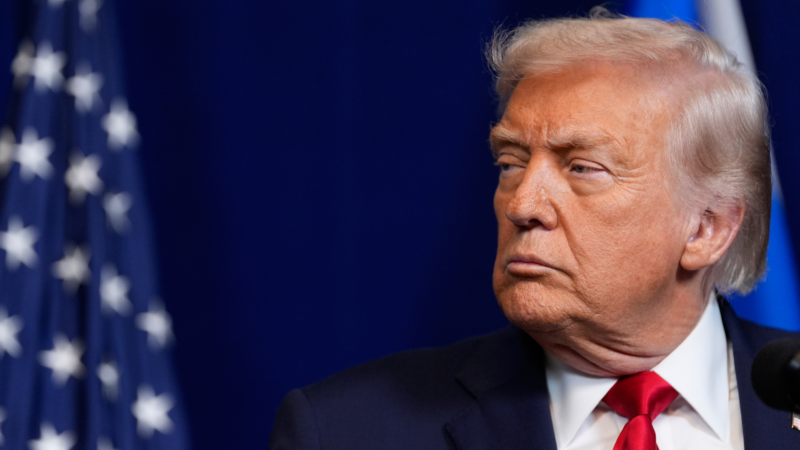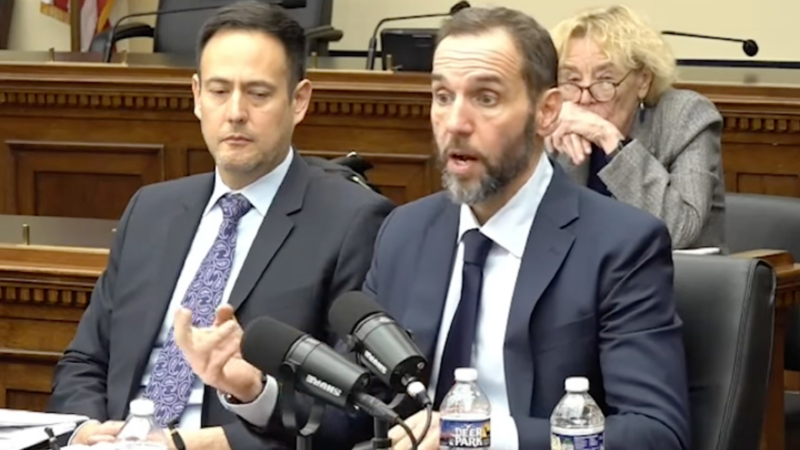Transfer to Alaska? Offer to health leaders called ‘insult’ to Indian Health Service
The emails started arriving late on a Monday night.
“The Department of Health and Human Services (HHS) proposes to reassign you as part of a broader effort to strengthen the department and more effectively promote the health of American people,” the email read. “One critical area of need is in the American Indian and Alaskan Native communities.”
Amid the Trump administration’s massive layoffs at HHS, these reassignment emails accelerated an apparent purge of leadership at federal health agencies. Top officials in different parts of HHS were put on administrative leave with the option of relocating to a new job in Alaska, Montana, New Mexico or other postings within the Indian Health Service (IHS).
“I did not see this coming at all,” a senior executive at the Department of Health and Human Services told NPR. The executive asked not to be identified for fear of retribution from the administration.
William “Chief Bill” Smith chairs an organization that advocates for the IHS on behalf of tribes, the National Indian Health Board. “Any major leadership changes within IHS should be made in full consultation with Tribal Nations, as required by law,” Smith wrote in a statement to NPR. “Tribal Consultation is not just a procedural step—it is a fundamental responsibility of the federal government.”
“Utmost disrespect”
The number of health leaders who got the emails and the reasons for who was picked remain unclear. The email doesn’t specify what will happen to those placed on administrative leave if they don’t accept the offer.
HHS did not respond to NPR’s questions about the scope of the reassignment offers. NPR has confirmed nine leaders got the reassignment email; there may be more.
“The move displays the utmost disrespect for public service. It is clearly designed to force talented scientists and health experts to leave government,” says Richard Besser, CEO of the Robert Wood Johnson Foundation, a nonprofit philanthropy focused on health. “It is also an insult to those health care professionals in the Indian Health Service who dedicate their lives to providing health care services on tribal lands.”
It is unclear if anyone took the offer or plans to take it.
“I’m a career public servant. I’ve worked for Republicans and Democrats,” the HHS executive told NPR. “Public service is noble work and the ability to serve our country and impact entire populations just by coming to work is a gift. So there’s a sadness that comes with this.”
Connections to Fauci
At the National Institutes of Health (NIH), some sources who spoke to NPR suspect the targets were picked as retribution dating back to the pandemic.
Dr. Jeanne Marrazzo, who took over as the director of the National Institute of Allergy and Infectious Diseases after Dr. Anthony Fauci departed, got the offer, according to an email obtained by NPR.
So did Fauci’s wife, Christine Grady, the top bioethicist at NIH, along with two others close to Fauci, according to a source who was not authorized to speak about the situation.
Fauci, who left the NIH in 2022, became a hero to many during the pandemic, but has also been vilified by critics of the government’s response. Dr. Francis Collins, who also worked closely with Fauci as NIH director, was recently forced out of the agency.
The offer appears to be “an opportunity to try and say they’re not being let go, they’re being offered a new opportunity,” said Susan Polan, associate executive director of the American Public Health Association. But that “does not seem to be the ultimate goal. The goal really does seem to be to undermine the leadership in these agencies.”
IHS used as “a pawn”
Polan spoke during a briefing last week by public health advocates and officials decrying cuts of about 10,000 workers at the Centers for Disease Control and Prevention, the Food and Drug Administration, the NIH and other agencies.
“IHS needs are not being met and it is being used as a pawn in the game of forcing HHS staff to resign instead of being fired,” Polan added later in an email to NPR.
“It’s a way to try to get people to quit,” added Dr. Phillip Huang, director of Dallas County Health and Human Services, at the briefing.
The Indian Health Service provides crucial services and deserves to be adequately staffed with the most qualified workers, Huang and others at the briefing said.
The officials, who got the offer on Monday, March 31 or Tuesday, April 1 had until 5 p.m. on Wednesday, April 2, to respond to the offer, according to the email obtained by NPR.
The email reads: “This underserved community deserves the highest quality of services, and HHS needs individuals like you to deliver that service.” It is from Thomas J. Nagy Jr., deputy assistant secretary for human resources at HHS.
Reassignment locations
Nagy’s email gives the officials the options of working in a variety of places that are a mix of states, cities and reservations. They appear to correspond to IHS areas, an official designation, with some exceptions. This is the list from the email:
- Alaska
- Albuquerque [New Mexico]
- Bemidji [Minnesota]
- Billings [Montana]
- Great Plains [South Dakota, North Dakota, Nebraska, Iowa]
- Navajo [Arizona, New Mexico, Utah]
- Oklahoma
“We would like to understand your preference across these potential reassignment opportunities,” the email says.
“Specifically, we would like to know which regions you would accept a voluntary reassignment and the order of your preference, if any, across the regions,” it states.
Health leaders offered transfer
According to sources who shared information with NPR on the condition of anonymity because they are not authorized to speak to the press, officials in addition to Marrazzo and Grady who received the IHS reassignment offer include:
– Dr. H. Clifford Lane, deputy director for clinical research at the National Institute of Allergy and Infectious Diseases, who had long worked with Fauci.
– Dr. Emily Erbelding, director of the division of microbiology and infectious diseases at the National Institutes of Allergy and Infectious Diseases.
– Renate Myles, director of communications for NIH;
– Dr. Eliseo J. Pérez-Stable, director of the National Institute on Minority Health and Health Disparities;
– Dr. Shannon Zenk, director of the National Institute of Nursing Research;
– Dr. Diana Bianchi, the director of the Eunice Kennedy Shriver National Institute of Child Health and Human Development.
– Brian King, director of the Food and Drug Administration’s Center for Tobacco Products.
IHS is a priority for RFK Jr.
The Indian Health Service was an early target of Elon Musk’s DOGE cuts, when 950 employees were fired in February. But HHS Secretary Robert F. Kennedy Jr. quickly intervened and said all of those staff should be rehired. “The Indian Health Service has always been treated as the redheaded stepchild at HHS,” Kennedy said at the time in a written statement to ICT, a nonprofit news organization that covers Indigenous people.

Kennedy announced he would be visiting the Navajo Nation in a western trip Monday through Wednesday. Kennedy dubbed it a “MAHA tour” — referring to his Make America Healthy Again slogan. He will also go to Arizona and Utah and meet with tribal leaders, though HHS did not share a precise itinerary in a press release on the trip.
Indian Health Service and all HHS divisions have been ordered to cut contract spending by 35%, HHS spokesman Andrew Nixon confirmed to NPR.
Georges Benjamin, executive director of the American Public Health Association, says broader cuts to federal health programs affect tribal communities, too. “When they cut grants or close down CDC programs they also directly and indirectly cut IHS programs,” he says.
Benjamin says he doesn’t think the intent of the NIH reassignment offers was to “hurt or demean” IHS, but to “take a person trained in clinical skills that has not been practicing clinically is usually not helpful if the job is a clinical one or even a clinical manager job.” He added: “The most cynical view is this is a way to get senior people to quit.”
Smith, who is from Valdez Village in Alaska and who chairs the National Indian Health Board, says tribal leaders need the chance to weigh in on any changes.
“We urge the Department of Health and Human Services (HHS) to uphold this obligation and engage in meaningful Tribal Consultation before moving forward with any reassignments,” Smith wrote in the statement.
Other top federal health officials who have been recently forced out include Dr. Peter Marks, who was the top vaccine regulator at the FDA.
Zohran Mamdani sworn in as New York City mayor, capping historic rise
Mayor Zohran Mamdani took the oath of office in New York City after midnight Thursday. The city's first Muslim mayor, a member of the Democratic Socialists of America, has promised to focus on affordability and fairness.
Rising from the ashes, a symbol of hope at the Rose Parade
Survivors of the Eaton and Palisades Fires find healing and community working on a Rose Parade float to honor the lives and communities lost in last year's wildfires.
The history behind the NYC subway station chosen for Mamdani’s swearing-in
The city shut down the station in 1945 on New Year's Eve. Eighty years later, it's a symbolic venue choice for the incoming mayor's private swearing-in ceremony.
U.S. military strikes 5 more alleged drug boats, killing 8
The U.S. military says it struck five alleged drug-smuggling boats over two days. The attacks killed eight people, while others jumped overboard and may have survived. U.S. Southern Command did not reveal where the attacks occurred.
Capitol riot ‘does not happen’ without Trump, Jack Smith told Congress
Former special counsel Jack Smith also described President Trump as the "most culpable and most responsible person" in the criminal conspiracy to overturn the 2020 election results, according to a transcript of Smith's closed-door interview with the House Judiciary Committee.
Trump will drop push for National Guard deployments in Chicago, LA and Portland, Ore.
Courts blocked troops from deploying in Chicago and Portland, Ore., and the Los Angeles deployment effectively ended after a judge blocked it earlier this month.







